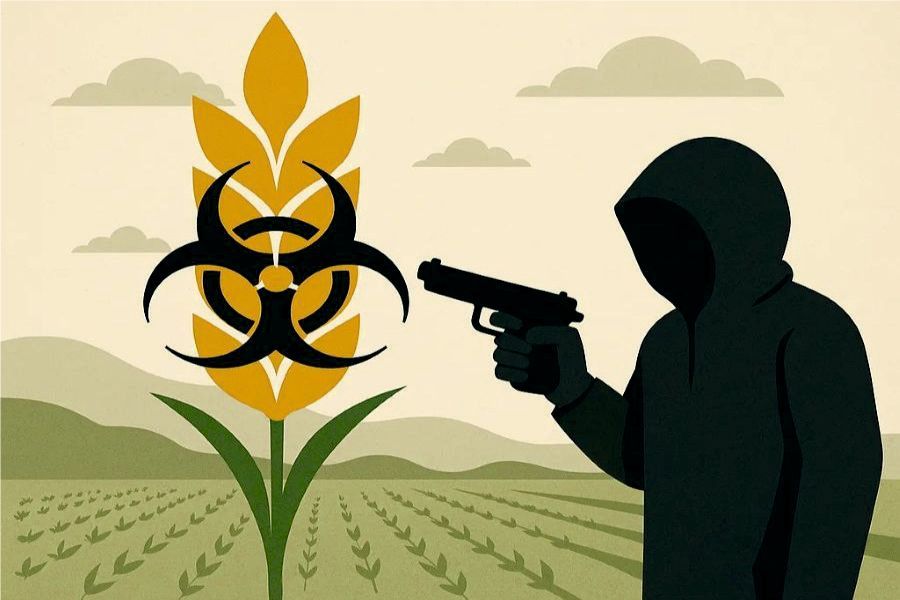Agroterrorism: Recent events in the United States serve as a stark warning for India.
In July 2024, two individuals—Chinese researchers Yunqing Jian and Zunyong Liu—were arrested while attempting to smuggle Fusarium graminearum, a notorious crop-destroying fungus, into the U.S. The FBI has called it a “potential agroterrorism weapon” capable of causing head blight in wheat, maize, barley, and rice—staples upon which billions depend. Meanwhile, a U.S.-based China expert has warned that such a threat could be worse than COVID-19.
Why This Matters for India and Punjab
Food Security Is National Security
India’s 1.4 billion people rely heavily on wheat and rice. Punjab alone contributes nearly 20% of India’s wheat output. An agro-pathogen targeting these crops could devastate yields, disrupt distribution, inflate prices, and spark political unrest.
Punjab in the Crosshairs
Punjab’s position as India’s “breadbasket” makes it a high-value target. A fungal pathogen—especially one engineered for resistance or virulence—could spread rapidly across irrigated wheat belts. A localized outbreak might escalate into a national food crisis.
 Biothreats Are Evolving
Biothreats Are Evolving
Unlike naturally occurring crop diseases, agroterrorism involves the deliberate introduction of lab-grown or enhanced pathogens. According to U.S. officials, the smuggled fungus could have engineered traits that cause liver damage and reproductive issues in humans and livestock—a chilling fusion of agricultural and biological warfare.
Global Precedents: U.S. Alerts Ring Alarm Bells
Think tanks and lawmakers in the U.S. have responded with urgency. Some have described it as “an attack on the American food supply.” Policymakers are considering visa crackdowns and stricter oversight of foreign-funded labs. India must adopt a similarly proactive posture.
What India and Punjab Must Do
- Tighten biosecurity controls: All imports of microbes—whether for farms, university labs, or commercial use—must require USDA-style licensing. The import/export of fungal cultures should be tracked with full forensic transparency.
- Upgrade lab oversight: Research institutions in Punjab must be registered and meet biosafety category standards. Any foreign collaboration or funding in phytopathology should undergo review by a national biosecurity board.
- Implement real-time crop surveillance: Satellite remote sensing and in-field diagnostics must be deployed across India’s wheat belt. Early detection is critical for containment.
- Train rapid-response teams: At the district and state levels, multidisciplinary “crop forensics” units must be equipped to detect, isolate, and neutralize threats—modelled after epidemic response protocols.
- Foster international cooperation: India should establish data- and pathogen-sharing agreements with the WHO, FAO, and G20 partners to monitor emerging agro-threats.
Potential ’agroterrorism weapon’ fungus smuggled into US by Chinese scientists, FBI alleges
The U.S. fungus-smuggling case is not a distant incident—it’s a wake-up call. As global biotech advances, so does the threat of agroterrorism. For India—already grappling with hunger, climate shocks, and farm distress—the stakes are existential. Punjab’s fields are not merely regional assets; they are strategic national resources. Protecting them demands vigilance, investment, and institutional reform. We cannot allow the next frontier of terror to starve us. ![]()
________
Also Read:
Ceasefire Politics: When the Opposition Misses the Moment
Disclaimer : PunjabTodayNews.com and other platforms of the Punjab Today group strive to include views and opinions from across the entire spectrum, but by no means do we agree with everything we publish. Our efforts and editorial choices consistently underscore our authors’ right to the freedom of speech. However, it should be clear to all readers that individual authors are responsible for the information, ideas or opinions in their articles, and very often, these do not reflect the views of PunjabTodayNews.com or other platforms of the group. Punjab Today does not assume any responsibility or liability for the views of authors whose work appears here.
Punjab Today believes in serious, engaging, narrative journalism at a time when mainstream media houses seem to have given up on long-form writing and news television has blurred or altogether erased the lines between news and slapstick entertainment. We at Punjab Today believe that readers such as yourself appreciate cerebral journalism, and would like you to hold us against the best international industry standards. Brickbats are welcome even more than bouquets, though an occasional pat on the back is always encouraging. Good journalism can be a lifeline in these uncertain times worldwide. You can support us in myriad ways. To begin with, by spreading word about us and forwarding this reportage. Stay engaged.
— Team PT


 Biothreats Are Evolving
Biothreats Are Evolving